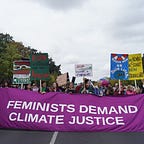“Not Without Us!” at the CSW66: Pathways to a feminist just transition
Melissa Moreano and Ndivile Mokoena from Not Without Us! took part in a side event during the sixty-sixth session of the Commission on the Status of Women to discuss pathways to a feminist just transition. The side event was organised by the Rosa Luxemburg Foundation, LIFE e.V. and Madre.
Melissa Moreano from Critical Geography Collective Ecuador underlined the link between just transition and violence, specifically gender violence, caused by fossil fuel companies and their extractivist industries.
Dunja Krause from UNRISD talked about the term “just transition” and explained that before it entered the climate justice movement, the term is rooted in the (extractivist industries’) workers movement, which is traditionally a male dominated sector — which explains why gender justice is often not so prominent in the discourse.
Ndivile Mokoena from Gender CC Southern Africa discussed the importance of a community-led just transition that takes into account intersectionality and social issues and includes the informal sector, which is often left out.
Faith Nataya from the Indigenous people of the Maasai in Kenya shared experiences about working with indigenous women and girls on issues of climate change. Gender specific inequalities have limited their ability to live with climate change, but they have been at the forefront of developing coping mechanisms for climate resilience and climate disasters. This has had a positive impact on the way in which they are viewed in the communities and has changed the narrative.
The speakers discussed how a feminist perspetice takes into account the often left-out sectors in which women and/or migrant workers work, such as care work and the informal sector. For climate change resilience, care work relating to infrastructure, supporting communities, water and food takes a central role, this also includes the recognition of the importance of emotional support as part of care work. Feminists, local communities and marginalized groups are at the centre of care work. Social dialogues on what their needs are and what they want to see in a just transition must be established, so that it is made sure they have access to resources, such as land and water, education, skills and training to develop their solutions for climate resilience.
A feminist approach to Just transition also allows us to point out that some approaches labelled as Just Transition, which however are not good enough to be defined as such; for example, changing energy production in the global north while continuing to extract resources in the Global South. It is important to build alliances between the workers’ movement and the climate justice movement, the people fighting for climate justice in the Global North and the people fighting extractivism in the global south, because energy transition in Europe and North America must not happen on the back of workers and communities in the Global South. The key is international solidarity between people instead of benefits for corporations and industries
Moving forward it is thus impotence to support efforts for a community-led just transition, which also includes feminist and youth groups, and fight for the elimination of violence together with just transition while upholding human rights and achieving enviornmental justice. This must inform policies in future talks of the UNFCCC process.
The full event can be watched here: https://www.youtube.com/watch?v=f-mo2gXKrOA
